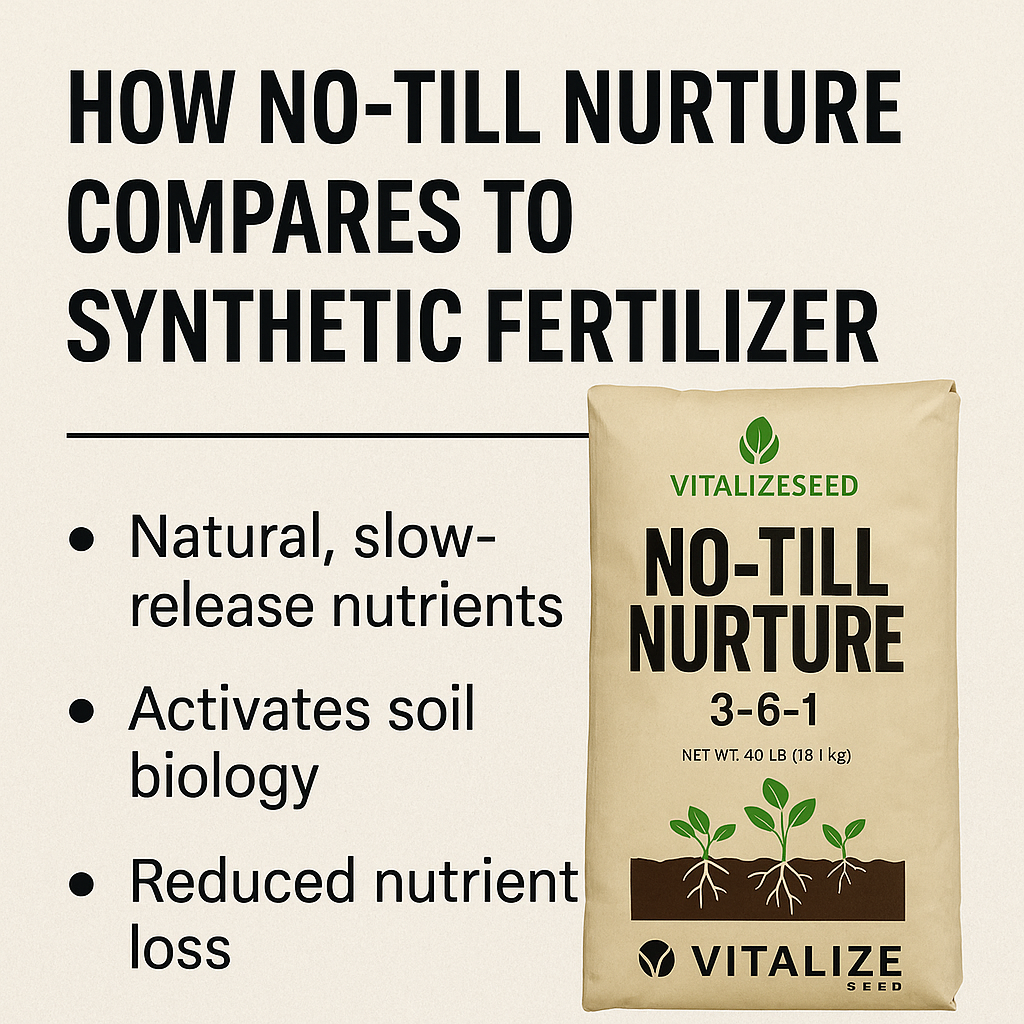
How Does No-Till Nurture Compare to Synthetic Fertilizer? Here's How It Wins!
Share
How Does No-Till Nurture Compare to Synthetic Fertilizer? Here's How It Wins.
When people see 3-6-1 on a bag of No-Till Nurture, their first thought is often,“Can that really compare to something like 13-13-13?”
And the answer is: yes, and it does far more.
No-Till Nurture isn’t just another fertilizer. It’s a complete, soil-first solution for growers who want:
- Efficient, plant-available nutrients
- Long-lasting microbial stimulation
- Residue breakdown and organic cycling
- And improved soil over time, not just short-term green-up
Let’s walk through why more growers are making the switch.
Synthetic Fertilizer: High Volume, High Loss, and Low Biology
Products like 13-13-13 rely on high application rates to compensate for inefficiency:
- Nitrogen volatilizes and leaches
- Phosphorus ties up in the topsoil within days
- Potassium leaches on sandy or low-CEC soils
- And when used heavily, synthetics can suppress the plant–microbe partnership
Here’s why that matters: when you force-feed a plant highly soluble NPK, it stops releasing root exudates, the sugars, amino acids, and acids that fuel microbial life. And without those microbes, you lose your soil’s ability to unlock tied-up nutrients.
“Synthetic fertilizers feed the plant. No-Till Nurture feeds the system that feeds the plant.”
No-Till Nurture: Organic Nutrition That Works With Biology
No-Till Nurture is different. It works with the soil, not against it.
Each application delivers:
- Organic N–P–K in low-salt, biologically active forms
- Humic and fulvic acids to stabilize nutrients and stimulate microbial response
- Microbial food to increase fungal and bacterial activity
- Carbon and trace elements that help unlock tied-up fertility through mineralization and chelation
As a result, No-Till Nurture doesn’t just feed the plant, it stimulates root exudation, which:
- Attracts beneficial microbes
- Enhances nutrient cycling
- Unlocks additional NPK already in your soil
- Sustains long-term soil fertility with less dependence on synthetic inputs
“With No-Till Nurture, you’re not just applying nutrients, you’re activating the engine that releases them.”
Science-Backed Boost: Organic Amendments Unlock More Nutrients Than You Apply
Research shows that organic amendments—like composted nutrients or manure-based inputs—do more than feed plants directly. They stimulate soil microbes, which can significantly increase the pool of plant-available N and P already in your soil:
- A long-term meta-analysis across multiple cropping systems found that combining organic amendments with synthetic fertilizer improved P use efficiency, making more phosphorus available than applying synthetic alone (link.springer.com).
- Organic amendments consistently boost microbial biomass phosphorus (MBP), and when microbes turn over, that P is released gradually and efficiently into plant-available forms (frontiersin.org).
- Compost applications increase microbial activity, enzyme processes, soil organic matter, and plant nutrient availability, often leading to improved crop growth beyond what’s expected from the applied nutrients alone (mdpi.com).
“You’re not just adding nutrients, you’re unlocking the nutrients you’ve already paid for.”
Nutrients That Move, Not Sit on Top
Unlike synthetic phosphorus that gets stuck near the surface (and may stay there for decades in no-till systems), the nutrients in No-Till Nurture:
- Move downward with moisture and microbial activity
- They are stabilized by humics, reducing tie-up and leaching
- Stay in the root zone longer, where they can be used
Easy Spread Technology: Manure Benefits Without the Hassle
Want the benefits of manure without needing a manure spreader or the smell?
That’s exactly what Easy Spread was built for.
- Clean, uniform granules that broadcast easily by hand or spreader
- No mess, no clumping, no clogging
- Low odor and low salt, safe around people, pets, lawns, and gardens
Whether you’re spreading across a food plot, lawn, orchard, or garden, it’s smooth, predictable, and simple.
For Gardens, Orchards, and Lawns: One Bag Does a Lot
Garden Use
Apply pre-plant as a build program or top-dress throughout the season. Because nutrients are mineralized biologically, there’s no burn risk, even around young transplants.
Orchards
Broadcast around the drip line. As moisture and microbes work, nutrients move into the root zone, boosting health without disrupting biology.
Lawncare
Apply No-Till Nurture before rain or irrigation to slow-feed turf.
If you have a large yard, apply 40 lbs per acre as needed or based on your soil test. You’ll see healthy, deep green growth without harsh synthetics or chemical residue.
“It’s the simplicity of a granular with the benefits of compost or manure. And it won’t burn or stink.”
Build vs. Maintain: Flexible Application Strategy
Some growers start with a build program using 120–200 lbs/acre to kickstart biology and nutrient cycling. After that, they shift to a maintenance rate of 40–80 lbs/acre at planting or seasonally.
| Program Type | Rate | Bulk Cost/Acre | Goal |
|---|---|---|---|
| Build | 120–200 lbs/acre | ~$150–$250 | Jumpstart biology, improve cycling, reduce compaction |
| Maintain | 40–80 lbs/acre | ~$50–$100 | Sustain biology, aid fertility, feed the system |
“Think of it like charging your soil’s battery. The build rate recharges it. The maintenance rate keeps it running strong.”
What About Cost?
A 40 lb bag of No-Till Nurture retails at $74.99, but in bulk (half pallet or more), the price drops to $49.99 per bag.
That puts it right in line with most synthetic fertilizer programs, except you’re not just paying for NPK. You’re getting:
- Organic, slow-release nutrients
- Microbial stimulation
- Humics and carbon
- Long-term soil building, not short-term flash
“Synthetic programs are about feeding the plant today. No-Till Nurture feeds the soil so your system can feed itself tomorrow.”
Where Do Foliars Fit In?
While No-Till Nurture focuses on building the soil and biological base, foliar applications are a valuable tool to:
- Stimulate growth during stress periods
- Feed nutrients directly through the leaf
- Support microbial cycling in the rhizosphere
- Deliver trace minerals and plant-ready forms of nutrition in-season
Together, they work in synergy.
“No-Till Nurture builds the engine. Foliars help it run smoother, cleaner, and more efficiently during the race.”
If you’ve already invested in soil health with No-Till Nurture, adding foliars at key times helps maintain plant health, nutrient cycling, and yield performance without disrupting the biology you’ve worked hard to build.
You’re Not Just Feeding the Plant, You’re Feeding the System
| Feature | What No-Till Nurture Does |
| Humic & fulvic acids | Improve nutrient retention, reduce tie-up, increase uptake efficiency |
| Microbial food sources | Stimulate fungi and bacteria that mineralize nutrients already in your soil |
| Organic N–P–K | Moves through the profile and supports natural cycling |
| Low salt index | Safe for seedlings, lawns, gardens, and trees |
| Easy Spread granules | Clean, uniform, odor-free application |
| Soil-building base | Improves tilth, water holding, and long-term fertility |
| Supports root exudation | Keeps the plant-microbe loop alive and functioning, unlocking even more fertility already in your system |
Don’t Just Take Our Word for It — Here’s the Science
- University of Missouri Extension — Managing Urea Fertilizer (WQ340)
- Syers et al., 2008 — Efficiency of Soil and Fertilizer Phosphorus Use (FAO)
- USDA ARS — Phosphorus Stratification in No-Till Systems
- Richardson & Simpson, 2011 — Soil Microorganisms Mediating Phosphorus Availability, Plant Physiology
- Christine Jones, PhD — Nitrogen: The Double-Edged Sword
- USDA NRCS — Soil Biology Primer
